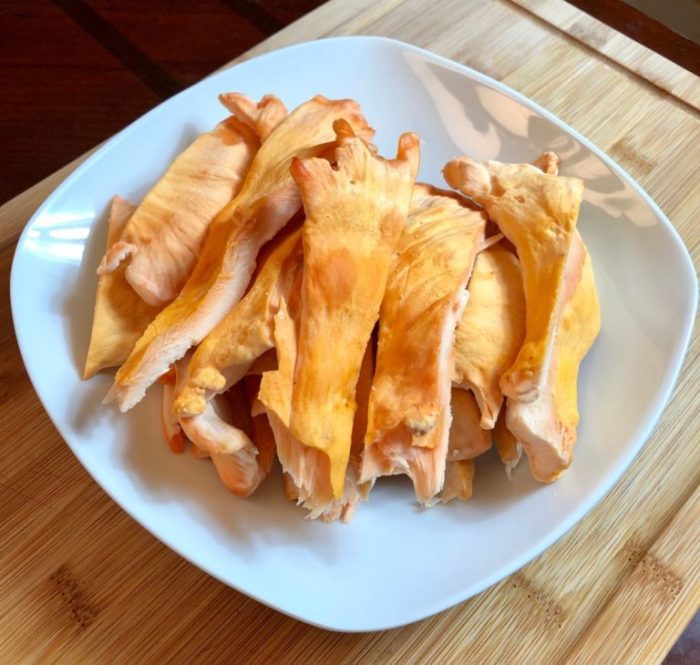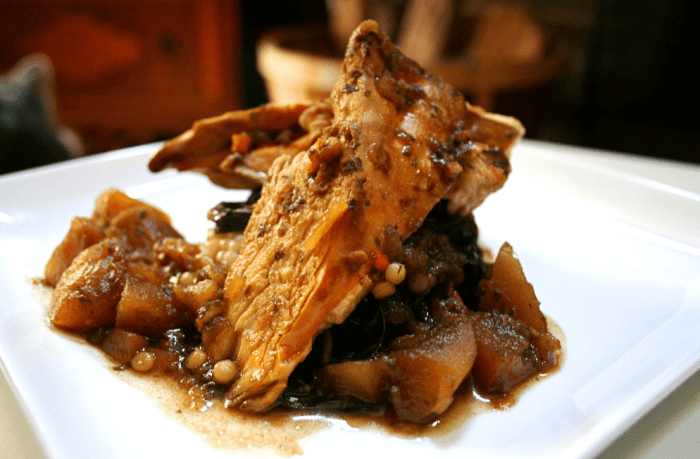
Chicken of the woods recipe is a culinary adventure that takes you into the realm of wild mushrooms. Get ready to explore a diverse range of mouthwatering recipes that showcase the unique flavor and versatility of this edible fungus. From grilling to sautéing and roasting, we’ll guide you through various cooking methods that bring out the best of chicken of the woods.
Beyond its culinary delights, chicken of the woods recipe also delves into the nutritional value and health benefits of this superfood. Discover its richness in vitamins, minerals, and antioxidants, and learn how incorporating it into your diet can support a healthier lifestyle.
Culinary Delights
Prepare to tantalize your taste buds with an array of delectable Chicken of the Woods recipes. This extraordinary mushroom boasts a meaty texture and a savory, slightly earthy flavor that will elevate any dish. From grilling to sautéing to roasting, explore the culinary possibilities of this woodland treasure.
Chicken of the Woods’ unique flavor profile harmonizes beautifully with a wide range of ingredients. Its umami-rich character complements hearty meats, while its subtle sweetness balances acidic sauces. Experiment with various herbs and spices to create dishes that are both flavorful and visually stunning.
Grilled Chicken of the Woods
Fire up the grill for a smoky, savory treat. Slice Chicken of the Woods into thick strips, brush with olive oil, and season with salt and pepper. Grill over medium heat until tender and slightly charred. Serve with a zesty chimichurri sauce for an unforgettable experience.
Nutritional Value and Health Benefits

Chicken of the Woods is a nutritional powerhouse, boasting an impressive array of vitamins, minerals, and antioxidants. It’s a rich source of fiber, which aids in digestion and promotes satiety. Furthermore, it contains an abundance of potassium, essential for maintaining electrolyte balance and regulating blood pressure.
Antioxidants
Chicken of the Woods is packed with antioxidants, which play a crucial role in protecting cells from damage caused by free radicals. These antioxidants include ergothioneine, a potent antioxidant with anti-inflammatory properties. Studies have shown that consuming Chicken of the Woods can boost antioxidant levels in the body, potentially reducing the risk of chronic diseases such as cancer and heart disease.
Who knew mushrooms could taste like chicken? If you’re looking for a unique culinary experience, try out this chicken of the woods recipe . These wild mushrooms have a meaty texture and a slightly nutty flavor that pairs well with a variety of seasonings.
Whether you’re a seasoned forager or just curious about trying something new, this recipe is sure to impress your taste buds.
Vitamins and Minerals
This mushroom is a good source of vitamins B1, B2, and B3, which are essential for energy production and nerve function. It also contains vitamin D, crucial for bone health and immune function. Additionally, Chicken of the Woods is rich in minerals such as iron, zinc, and selenium, all of which are vital for overall health and well-being.
If you’re looking for a more traditional approach to cooking chicken of the woods, check out this chicken of the woods recipe . This recipe uses simple ingredients and techniques to highlight the natural flavors of the mushrooms. Whether you’re sautéing them with garlic and butter or grilling them over an open flame, this recipe is sure to deliver a delicious and satisfying meal.
Immune Support
Chicken of the Woods has been shown to have immune-boosting properties. It contains compounds that stimulate the production of white blood cells, which are essential for fighting off infections. Moreover, its high antioxidant content helps protect the immune system from damage caused by oxidative stress.
Potential Health Benefits
- May support a healthy heart by lowering cholesterol levels and reducing inflammation.
- May boost the immune system and protect against infections.
- May reduce the risk of chronic diseases such as cancer and heart disease.
- May aid in weight management due to its high fiber content.
Incorporating Chicken of the Woods into your diet can contribute to a healthy lifestyle by providing a wealth of nutrients and potential health benefits. However, it’s important to note that it should be consumed in moderation, as excessive consumption may cause gastrointestinal issues.
Identification and Foraging Techniques
Chicken of the Woods is an unmistakable mushroom, with its bright orange color and fleshy, chicken-like texture. It is found in North America, Europe, and Asia, and is a popular edible mushroom.To identify Chicken of the Woods, look for its distinctive orange color, which can range from bright orange to deep orange.
The mushroom has a fleshy, fan-shaped cap that can grow up to 12 inches across. The cap is often covered with small, velvety hairs. The underside of the cap is covered with small, white pores.Chicken of the Woods is found in forests, where it grows on dead or dying trees.
It is most commonly found on oak trees, but can also be found on other types of trees.When foraging for Chicken of the Woods, it is important to be aware of its potential lookalikes. One lookalike is the False Chicken of the Woods, which is a poisonous mushroom.
The False Chicken of the Woods has a similar color to Chicken of the Woods, but it has a smoother cap and its underside is covered with gills, not pores.Another lookalike is the Lobster Mushroom, which is an edible mushroom.
The Lobster Mushroom has a similar color to Chicken of the Woods, but it has a smaller cap and its underside is covered with spines, not pores.When foraging for Chicken of the Woods, it is important to practice ethical and sustainable foraging practices.
This includes only harvesting mushrooms that you are sure are edible, and leaving some mushrooms behind for other foragers and wildlife.
Culinary Applications: Chicken Of The Woods Recipe

The versatility of Chicken of the Woods in the kitchen is remarkable. It can be prepared in a wide array of culinary applications, offering a meaty texture and a unique umami flavor.
Chicken of the Woods can be utilized as a meat substitute, particularly in vegan and vegetarian dishes. Its firm texture makes it a suitable replacement for chicken in stir-fries, soups, stews, and curries. It can also be roasted or grilled, providing a flavorful and healthy alternative to traditional meat dishes.
Flavor Enhancer
Chicken of the Woods is not just a meat substitute but also an excellent flavor enhancer. Its rich umami taste adds depth and complexity to various dishes. It can be sautéed with vegetables, added to pasta sauces, or used as a seasoning in soups and stews.
The earthy, slightly sweet flavor of Chicken of the Woods complements a wide range of ingredients, making it a versatile addition to any kitchen.
Unique Dishes
Beyond its use as a meat substitute or flavor enhancer, Chicken of the Woods can also be incorporated into unique and creative dishes. Its unique texture and flavor make it an excellent ingredient for salads, pizzas, and even desserts. Experimenting with different cooking techniques, such as pickling, smoking, or drying, can further enhance its versatility and create exciting culinary experiences.
Preservation and Storage Techniques
To extend the shelf life of Chicken of the Woods, various preservation techniques can be employed. Drying, freezing, and pickling are common methods to preserve the mushroom’s flavor and nutritional value.
Drying
Drying Chicken of the Woods is an effective way to preserve it for several months. Cut the mushroom into thin slices and spread them evenly on a drying rack. Place the rack in a well-ventilated area with low humidity and allow the mushrooms to dry for several days or until they are brittle.
Once dried, store them in an airtight container in a cool, dark place.
Freezing
Freezing is another convenient method for preserving Chicken of the Woods. Clean and slice the mushrooms, then blanch them in boiling water for 2-3 minutes. Drain the mushrooms and pat them dry before freezing them in airtight containers or freezer bags.
Frozen Chicken of the Woods can be stored for up to 6 months.
Pickling
Pickling is a traditional method of preserving Chicken of the Woods that imparts a tangy flavor to the mushroom. Clean and slice the mushrooms, then place them in a jar with a brine solution made of vinegar, water, salt, and sugar.
Seal the jar and store it in a cool, dark place for at least 2 weeks before consuming.
Storage, Chicken of the woods recipe
To maintain the quality and flavor of Chicken of the Woods, proper storage is crucial. Fresh mushrooms should be stored in a paper bag or perforated plastic bag in the refrigerator for up to 5 days. Avoid washing the mushrooms before storing them, as this can shorten their shelf life.
Summary

Chicken of the woods recipe is a testament to the wonders of nature’s bounty. With its versatility in the kitchen and its potential health benefits, this wild mushroom is a culinary gem waiting to be explored. Whether you’re a seasoned forager or a curious home cook, this guide will empower you to unlock the culinary potential of chicken of the woods.
Answers to Common Questions
What are the best cooking methods for chicken of the woods?
Chicken of the woods can be grilled, sautéed, roasted, or fried. Each method brings out different flavors and textures, so experiment to find your favorite.
Is chicken of the woods a good source of protein?
Yes, chicken of the woods is a good source of protein, containing about 20% protein by weight.
Can I eat chicken of the woods raw?
No, it’s not recommended to eat chicken of the woods raw. Cooking helps to kill any bacteria or parasites that may be present.





